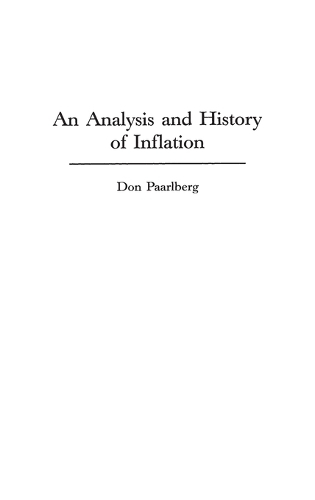
An Analysis and History of Inflation
(Hardback)
Publishing Details
An Analysis and History of Inflation
By (Author) Don Paarlberg
Bloomsbury Publishing PLC
Praeger Publishers Inc
10th December 1992
United States
Classifications
Tertiary Education
Non Fiction
332.4
Physical Properties
Hardback
208
Width 156mm, Height 235mm
510g
Description
This history and analysis examines 15 great inflations - from Ancient Rome, the French Revolution and post-World War I Germany to modern-day Brazil - with the aim of providing an understanding of the causes of inflation. A unique feature of the book is the evidence presented that a moderate dgree of inflation is usually accompanied by increased economic activity. Contrary to the views of many, moderate inflation appears to be welcomed by most people and assists in returning incumbent political leaders to power. In addition, the money illusion, the belief that money has constant value over time, is shown by the author to be grievously in error. Presenting views which are at odds with much of mainstream economics, Paarlberg concludes that inflation is caused by an excess of money, and since this creation of money is a government monopoly, governments are responsible for inflation. Additionally, various macroeconomic theories are unable to account for gyrations of production and prices. The best explanation for these matters, therefore, is to be found in institutional economics, which take into regard whatever forces exist, rather than focusing on a select few while purporting to hold others constant. This work should be of interest to scholars, students and laypeople in economics and economic history.
Reviews
The 15 case studies are brief and interesting. A selected and useful reading list is included for each case.-Choice
"The 15 case studies are brief and interesting. A selected and useful reading list is included for each case."-Choice
Author Bio
DON PAARLBERG is Professor Emeritus in the Department of Agricultural Economics at Purdue University. In addition to teaching, he has served in the administrations of Presidents Eisenhower, Nixon, and Ford. Dr. Paarlberg is the author of seven books including, Great Myths of Economics (1968) and Toward a Well-Fed World (1988).
